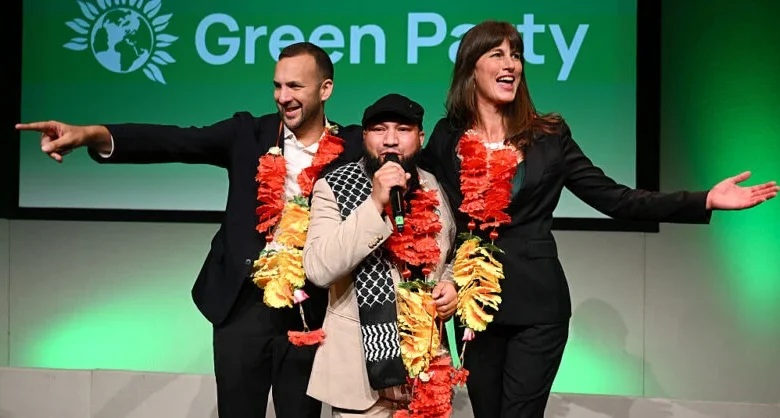The Green surge is about to break Labour

(Photo by Finnbarr Webster/Getty Images)
Zack Polanski has rocket-boosted the Greens’ performance in the polls. When he was elected leader, the Greens were an average of ten points behind Labour in the polls. Now, just two months later, they have closed that gap to three. If these trends continue, then we may see the Greens overtake Labour in a matter of weeks. This matters because polling does not just mirror parties’ performances, it has the potential to propel them. This would disrupt the traditional two party system would have huge implications for the future of the Labour Party and our politics. So why does it seem that so few people are talking about it?
Such was the extent of media speculation about Reform overtaking the Conservatives that when it happened at the end of last year it did not come as much of a shock. Even then, many are still reeling from the speed at which it accelerated the Tories’ decline, now languishing on just 16 per cent of the vote.
That crossover in the polls enabled Farage to more confidently claim that it was Reform, not the Conservatives, that were the best placed opposition to Labour. Despite Reform having five MPs compared to the Conservatives’ 119, the public now agree. Kemi Badenoch has almost been written out of the fight altogether as SW1 gears up for a Labour/Reform showdown in 2029.
But will things be as straight forward as that? I’m not so sure. The energy of British politics is already shifting away from the decades long tradition of the prime minister facing off against the leader of the opposition at PMQs, towards two populist politicians, one outside parliament and one only just let in, battling it out for views in ever more questionable Tik Toks.
A more powerful Green Party could prove an existential threat to Labour and could cannibalise its vote in the same way that Reform did to the Conservatives in 2024. Indeed, Labour have already lost half of their 2024 voters, with one in five going to the Greens. Just as the Conservatives pivoted to tougher stances on immigration and cultural issues in an attempt to fight off Reform, so too will Labour come under renewed pressure to shift leftwards in its approach.
There are signs of this happening already. Having been asleep at the wheel to the threat from Labour’s left, Starmer used a party conference to emphasise his progressive credentials. He confidently mounted an attack on parts of Reform’s policy platform as “racist” and “immoral” and defined the current political fight as one pitching optimism against division and decline. Just this week, he made a last-minute decision to fly to the Cop30 summit in Brazil to demonstrate his dedication to green causes. (The irony.) But we could see more pressure points emerge. A central plank of Polanski’s platform, an increase in wealth taxes to “end rip-off Britain”, is supported by 54 per cent of Green Party voters.
The current consensus is that Starmer could be out if Labour performs as badly as expected in next year’s local elections. In an environment where the Greens are performing strongly against Labour you could expect both the parliamentary party and its members to want to replace him with a more outwardly progressive leader. The prospect of Ed Miliband making a return to the Labour leadership would have seemed ridiculous a year ago, but his odds have shortened considerably. There could also be some changes on the backbenches of parliament. Reform has notched up a steady stream of Conservative defections. It is not far-fetched to think we could see the same from Labour to Green.
Treat yourself or a friend this Christmas to a New Statesman subscription from £2 per month
The Greens overtaking Labour would not just have an impact on policy and personnel, it would force Labour to redraw its approach to fighting Reform. Plaid Cymru’s decisive win in the recent Senedd by-election in Caerphilly demonstrated that a coalesced progressive coalition could defeat Farage. Recent YouGov polling further demonstrates the potential for tactical voting at the next election.
However, if the Greens overtake Labour in the polls, it will become harder for Labour to make the case that a vote for Polanski is a vote for Farage, and as a consequence more difficult for Labour to squeeze that vote. In an increasingly equal five-party fight, there would also be increased confusion among the public and pollsters alike as to who the best challenger in any particular seat would be.
Polanski has already shown unwillingness to make concessions to Labour. He has criticised Starmer for being a “handmaiden” for Reform’s “dangerous and deceitful politics”, said that “the alarm bells of authoritarianism” are “ringing” under his government and ruled out a future coalition as he has “perpetrated an ongoing genocide in Gaza”. Polanski would surely be even less likely to row in behind Labour should he overtake them in the polls.
And what about his voters? Fifty-three per cent of Green voters think that Labour and the Conservatives are similar, whereas 29 per cent say Labour and the Greens are. Already, one in four Green voters have a positive view of the Labour Party. Many of the progressive voters I speak to in my focus groups have abandoned Labour because they perceive the party to have failed a moral test, especially when it comes to the conflict in Gaza. These voters will not be easily persuaded to come back. The more airtime Polanski gets attacking Labour, the worse you can expect that to become and the more intractable that vote could prove.
None of this is guaranteed. That crossover may never happen, and the Greens’ success may well prove to be a flash in the pan. However, having witnessed the rise of Reform it would be unwise to underestimate the potential for not one but two populist parties to radically reshape our politics.
Scarlett Maguire is the founder and director of Merlin Strategy.
Further reading: [Zack Polanski faces up to Reform]




